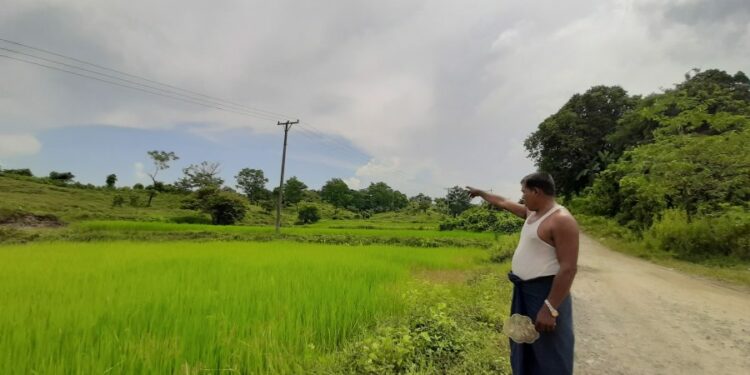Farmers in Rakhine State’s Kyaukphyu Township fear that the military regime will confiscate their land in the China-backed special economic zone (SEZ) in the township without giving them any compensation.
The junta has appointed former deputy rail transportation minister U Myint Thein as the chairman of the Kyaukphyu SEZ implementation committee, which has been making field surveys of the farmland in the project area, according to locals.
The regime has also formed a farmland ownership and registration committee and former Lower House lawmaker U Ba Shein from the Arakan National Party has been assigned to the committee.
U Ba Shein, who is a Kyaukphyu resident, met local farmers in late October. “There is still no transparency about land compensation. U Ba Shein said that an acre of land would be compensated with 1.8 million kyats (US$1,000). That amount is too low,” farmer U Hla Thein told The Irrawaddy.
Local farmers said that they had demanded between 50 million kyats (US$27,700) and 90 million kyats (US$50,410) per acre, depending on the type of land, plus rehabilitation benefits.
Some 250 acres of farmland are in the project area, according to local farmers. However, some say that their farmland on which they have traditionally worked has been found to be registered to another owner.
U Nu Aung, who farms four acres in Kyaukphyu, said, “Now they are even calling us squatters. These lands were handed down to us from generation to generation. And we have never sold our land.”
U Nu Aung said he is still working on the farmland, even though it is registered under someone else’s name.
When asked by The Irrawaddy, U Ba Shein said he is just acting as an intermediary between the Kyaukphyu SEZ implementation committee and local farmers.
“U Myint Thein has asked me to meet farmers. So I told them about the laws that they should know about. I am just an intermediary between the committee and the farmers,” said U Ba Shein.
Farmer U Saw Maung Nu from Thaing Chaung Village said he would not accept the project unless its details are disclosed transparently and compensation is paid in full.
Relevant departments surveyed land in villages in the SEZ in late 2016, according to locals.
The China International Trust and Investment Corporation (CITIC) won contracts for a proposed deep-sea port and SEZ projects in 2015. CITIC took an 85 per cent stake in the project, according to the initial agreement signed with the former U Thein Sein administration.
The now ousted National League for Democracy government renegotiated the agreement to increase Myanmar’s stake to 30 per cent. The initial agreement estimated the project to be worth US$9-10 billion (12-13 trillion kyats). However, both sides agreed to begin the project on a smaller scale after Myanmar raised concerns about the country being caught in a debt trap. The first phase of the port will cost around $1.5 billion (2 trillion kyats), according to the Ministry of Commerce.
The SEZ will be implemented on a 4,300 acre site spreading across nine village tracts. The deep-sea port will include two deep-water berths, while the first phase of the industrial zone will include garment and textile factories, manufacturing, banking and recreation centers.
Beijing considers the Kyaukphyu SEZ and deep-sea port especially vital to its Belt and Road Initiative, as it will give China direct access to the Indian Ocean, so allowing Chinese shipping to bypass the congested Strait of Malacca near Singapore, while boosting development in landlocked Yunnan Province, which borders Myanmar.
You may also like these stories:
Mytel CFO Most Prominent Victim So Far as Myanmar Military-Linked Firms Targeted
Low-Profile Junta Crony Imports and Makes Arms for Myanmar’s Military
Thousands Flee Homes as Myanmar Junta Steps Up Attacks

















